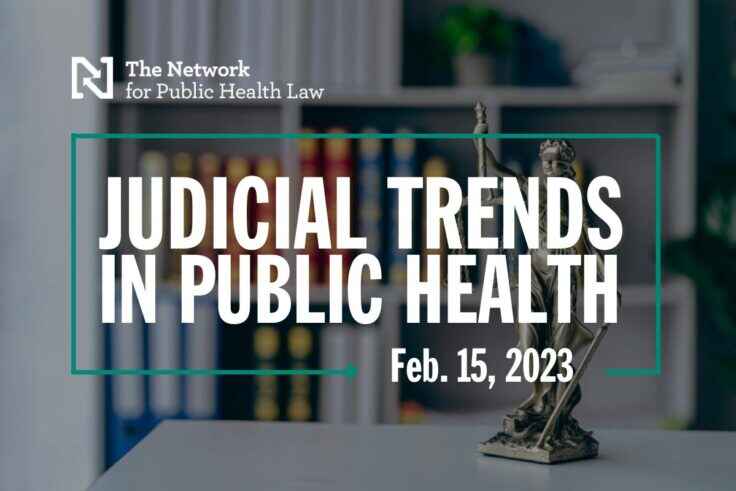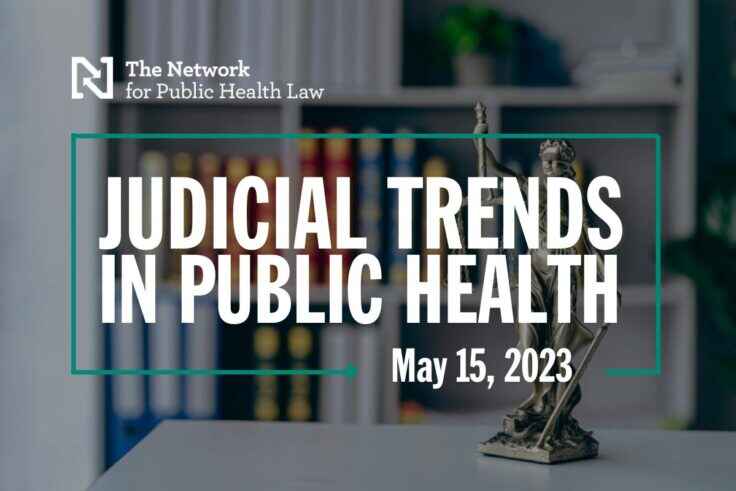|
The Network for Public Health Law monitors key court cases and relevant judicial trends in public health. The Network’s monthly reporter, Judicial Trends in Public Health (JTPH), highlights select published cases in public health law and policy from the prior three months. These cases are organized below by name, issuing court, date of issuance, along with a brief synopsis, and include link to the case abstract and hyperlink to the full decisions (when publicly available). For more information, including a topic digest of these and other cases, see below. Questions, comments, thoughts? Contact the Network for more information. South Bay United Pentecostal Church v. Newsom (U.S. Supreme Court, February 5, 2021): The Supreme Court blocked California’s COVID-19 order banning all indoor religious services, while leaving undisturbed categorical bans on singing/chanting amid services and occupancy limitations. Read the abstract here. American Hospital Association, et al. v. Azar (U.S. Court of Appeals, D.C. Circuit, December 29, 2020): The D.C. Circuit upheld a Department of Health and Human Services (HHS) regulation requiring that hospitals publish the prices they charge insurance companies for services/medications. Read the abstract here. Big Tyme Investments v. Edwards (U.S. Court of Appeals, 5th Circuit, January 13, 2021): The appellate court found that a July 2020 COVID-19 emergency order issued by Louisiana’s Governor prohibiting on-site consumption of alcohol and food at bars (while allowing on-site consumption at restaurants) did not violate the Equal Protection Clause. Read the abstract here. Olson v. United States (U.S. Court of Appeals, 9th Circuit, November 23, 2020): The 9th Circuit ruled that the standard for “willfulness” adopted by the Supreme Court for Fair Labor Standards Act (FLSA) claims also applies to Family and Medical Leave Act (FMLA) claims: whether the employer knows or shows reckless disregard for whether its conduct violates the statute. Read the abstract here. United States v. Safehouse, et al. (U.S. Court of Appeals, 3rd Circuit, January 12, 2021): The 3rd Circuit found that a Philadelphia planned safe injection facility would violate the federal Controlled Substances Act’s (CSA) so-called crack house provision. Safehouse planned to open a facility that would allow people to inject illicit drugs under the supervision of medical professionals. Read the abstract here. Prime Time Sports Grill, Inc. v. DTW 1991 Underwriting Limited (U.S. District Court, Middle District of Florida, December 17, 2021): A federal district court dismissed a Florida sport bar’s claim seeking insurance coverage for loss of business due to the COVID-19 pandemic and the State’s reductions in restaurant capacity for a period of time. Read the abstract here. University of Texas M.D. Anderson Cancer Center v. U.S. Department of Health and Human Services (U.S. Court of Appeals, 5th Circuit, January 14, 2021): The 5th Circuit vacated a $4.3 million HIPAA-related penalty imposed on the M.D. Anderson Cancer Center due to loss of technologic equipment containing electronic personal health information (ePHI) of more than 33,000 people. Read the abstract here. Cosgrove et al. v. Blue Diamond Growers (U.S. District Court, Southern District of New York, December 7, 2021): Finding that consumers consider vanilla to be a flavor and not a particular ingredient, a federal district court dismissed a case filed against Blue Diamond Growers based on their marketing of vanilla almond milk. Read the abstract here. Bard v. Monsanto Co. (Court of Appeals of Washington, Division 1, November 2, 2020): The appellate court found that the explicit purpose of Washington Revised Code § 43.20.050, authorizing the state board of health to adopt regulations regarding environmental conditions in public facilities, did not imply a cause of action for failure to enforce such regulations. Read the abstract here. Desrosiers, et al. v. Baker (Massachusetts Supreme Judicial Court, December 10, 2020): The Massachusetts Supreme Judicial Court upheld Governor Baker’s use of the Civil Defense Act (CDA) to order the closure of nonessential businesses and establish a reopening plan in response to the COVID-19 pandemic. Read the abstract here.
TOPICS: These and other cases are organized on the Network website under the topics below (adapted from chapter titles in Public Health Law in a Nutshell (3rd Edition) by James G. Hodge, Jr., Director, Network for Public Health Law—Western Region). Select a topic below to view all cases under that topic.
JTPH is a collaboration of the Network’s Western and Eastern Region Offices. Western Region contributors include: Jennifer Piatt, JD, James G. Hodge, Jr., JD, LLM, and Claudia Reeves. Eastern Region contributors include Kathi Hoke, JD, Kerri McGowan Lowrey, JD, MPH, Mathew R. Swinburne, JD, Brooke Torton, JD, and Megan Griest, MPP.
Legal information or guidance provided in this transmission or website does not constitute legal advice or representation. For legal advice, please consult specific legal counsel in your state. |




